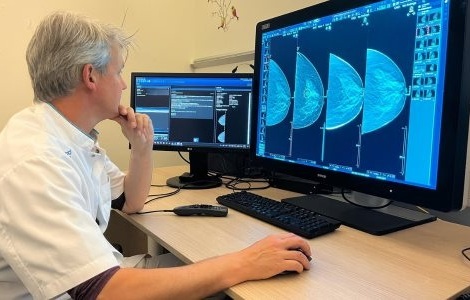New Type of Ultrasound Scan Can Diagnose Prostate Cancer Cases with High Accuracy
|
By MedImaging International staff writers Posted on 02 Mar 2022 |

An ultrasound scan can be used to detect cases of prostate cancer, according to new research.
Researchers at the Imperial College London (London, UK) have found that a new type of ultrasound scan can diagnose most prostate cancer cases with good accuracy in a clinical trial involving 370 men. The ultrasound scans missed only 4.3% more clinically important prostate cancer cases – cancer that should be treated rather than monitored – compared to magnetic resonance imaging (MRI) scans currently used to detect prostate cancer. The team believes that an ultrasound scan should be used as a first test in a community healthcare setting and in low and middle income countries which do not have easy access to high quality MRI scans. They say it could be used in combination with current MRI scans to maximize cancer detection.
One of the main methods to diagnose prostate cancer is a special type of MRI scan called a multi-parametric MRI (mpMRI) scan, which helps doctors see if there is any cancer inside the prostate and how quickly the cancer is likely to grow. However, the scan takes 40 minutes and is expensive. The new study looked at the use of a different kind of imaging called multiparametric ultrasound (mpUSS), which uses sound waves to look at the prostate. The test involves the use of a probe called a transducer to make the images of the prostate. It is placed into the rectum and it sends out sound waves that bounce off organs and other structures. These are then made into pictures of the organs.
The doctor doing the test also uses extra special types of ultrasound imaging that look at how stiff the tissue is and how much blood supply tissue has. These are called elastography, doppler and contrast-enhancement with microbubbles. As cancers are more dense and have greater blood supply, they show up more clearly. Although mpUSS is more widely available than mpMRI there has been no large-scale studies to validate its effectiveness as a test to detect prostate cancer cases.
In the new trial, called cancer diagnosis by multiparametric ultrasound of the prostate (CADMUS), the team recruited 370 men at risk of prostate cancer. They were identified following initial tests such as a prostate-specific antigen (PSA) test– a blood test to help detect prostate cancer – and/or an abnormal digital rectal examination - a test that examines a person's lower rectum, pelvis, and lower belly. The men were given both mpUSS and mpMRI scans at separate visits. This was then followed by biopsies - which involves using thin needles to take small samples of tissue from the prostate to analyse under a microscope to check cancer – for 257 patients who had a positive mpUSS or mpMRI test result. The team then compared the results from the tests.
Cancer was detected in 133 men, with 83 men diagnosed with clinically significant cancer. Individually, mpUSS detected 66 cases of clinically significant cancer compared to mpMRI which detected 77 cases. Although mpUSS detected 4.3% fewer clinically-important prostate cancers compared to mpMRI the researchers said this method would lead to 11.1 per cent more patients being biopsied. This was because the mpUSS sometimes showed up abnormal areas even though there was no cancer. The researchers believe that the test can be used as an alternative to mpMRI as a first test for patients at risk of prostate cancer, particularly where mpMRI cannot be carried out. Both imaging tests missed clinically-important cancers detected by the other, so using both would increase the detection of clinically-important prostate cancers compared to using each test alone.
“MRI scans are one of the tests we use to diagnose prostate cancer. Although effective these scans are expensive, take up to 40 minutes to perform and are not easily available to all. Also, there are some patients who are unable to have MRI scans such as those with hip replacements or claustrophobia fears. As cancer waiting lists build as a result of the COVID-19 pandemic, there is a real need to find more efficient and cheaper tests to diagnose prostate cancer,” said Professor Hashim Ahmed, lead author of the study and Chair of Urology at Imperial College London. “Our study is the first to show that a special type of ultrasound scan can be used as a potential test to detect clinically significant cases of prostate cancer. The can detect most cases of prostate cancer with good accuracy, although MRI scans are slightly better. We believe that this test can be used in low and middle income settings where access to expensive MRI equipment is difficult and cases of prostate cancer are growing.”
Related Links:
Imperial College London
Latest Ultrasound News
- Wearable Ultrasound Imaging System to Enable Real-Time Disease Monitoring
- Ultrasound Technique Visualizes Deep Blood Vessels in 3D Without Contrast Agents
- Ultrasound Probe Images Entire Organ in 4D

- Disposable Ultrasound Patch Performs Better Than Existing Devices
- Non-Invasive Ultrasound-Based Tool Accurately Detects Infant Meningitis
- Breakthrough Deep Learning Model Enhances Handheld 3D Medical Imaging
- Pain-Free Breast Imaging System Performs One Minute Cancer Scan
- Wireless Chronic Pain Management Device to Reduce Need for Painkillers and Surgery
- New Medical Ultrasound Imaging Technique Enables ICU Bedside Monitoring
- New Incision-Free Technique Halts Growth of Debilitating Brain Lesions
- AI-Powered Lung Ultrasound Outperforms Human Experts in Tuberculosis Diagnosis
- AI Identifies Heart Valve Disease from Common Imaging Test
- Novel Imaging Method Enables Early Diagnosis and Treatment Monitoring of Type 2 Diabetes
- Ultrasound-Based Microscopy Technique to Help Diagnose Small Vessel Diseases
- Smart Ultrasound-Activated Immune Cells Destroy Cancer Cells for Extended Periods
- Tiny Magnetic Robot Takes 3D Scans from Deep Within Body
Channels
Radiography
view channel
X-Ray Breakthrough Captures Three Image-Contrast Types in Single Shot
Detecting early-stage cancer or subtle changes deep inside tissues has long challenged conventional X-ray systems, which rely only on how structures absorb radiation. This limitation keeps many microstructural... Read more
AI Generates Future Knee X-Rays to Predict Osteoarthritis Progression Risk
Osteoarthritis, a degenerative joint disease affecting over 500 million people worldwide, is the leading cause of disability among older adults. Current diagnostic tools allow doctors to assess damage... Read moreMRI
view channel
Novel Imaging Approach to Improve Treatment for Spinal Cord Injuries
Vascular dysfunction in the spinal cord contributes to multiple neurological conditions, including traumatic injuries and degenerative cervical myelopathy, where reduced blood flow can lead to progressive... Read more
AI-Assisted Model Enhances MRI Heart Scans
A cardiac MRI can reveal critical information about the heart’s function and any abnormalities, but traditional scans take 30 to 90 minutes and often suffer from poor image quality due to patient movement.... Read more
AI Model Outperforms Doctors at Identifying Patients Most At-Risk of Cardiac Arrest
Hypertrophic cardiomyopathy is one of the most common inherited heart conditions and a leading cause of sudden cardiac death in young individuals and athletes. While many patients live normal lives, some... Read moreNuclear Medicine
view channel
PET Imaging of Inflammation Predicts Recovery and Guides Therapy After Heart Attack
Acute myocardial infarction can trigger lasting heart damage, yet clinicians still lack reliable tools to identify which patients will regain function and which may develop heart failure.... Read more
Radiotheranostic Approach Detects, Kills and Reprograms Aggressive Cancers
Aggressive cancers such as osteosarcoma and glioblastoma often resist standard therapies, thrive in hostile tumor environments, and recur despite surgery, radiation, or chemotherapy. These tumors also... Read more
New Imaging Solution Improves Survival for Patients with Recurring Prostate Cancer
Detecting recurrent prostate cancer remains one of the most difficult challenges in oncology, as standard imaging methods such as bone scans and CT scans often fail to accurately locate small or early-stage tumors.... Read moreGeneral/Advanced Imaging
view channel
New Algorithm Dramatically Speeds Up Stroke Detection Scans
When patients arrive at emergency rooms with stroke symptoms, clinicians must rapidly determine whether the cause is a blood clot or a brain bleed, as treatment decisions depend on this distinction.... Read more
3D Scanning Approach Enables Ultra-Precise Brain Surgery
Precise navigation is critical in neurosurgery, yet even small alignment errors can affect outcomes when operating deep within the brain. A new 3D surface-scanning approach now provides a radiation-free... Read moreImaging IT
view channel
New Google Cloud Medical Imaging Suite Makes Imaging Healthcare Data More Accessible
Medical imaging is a critical tool used to diagnose patients, and there are billions of medical images scanned globally each year. Imaging data accounts for about 90% of all healthcare data1 and, until... Read more
Global AI in Medical Diagnostics Market to Be Driven by Demand for Image Recognition in Radiology
The global artificial intelligence (AI) in medical diagnostics market is expanding with early disease detection being one of its key applications and image recognition becoming a compelling consumer proposition... Read moreIndustry News
view channel
GE HealthCare and NVIDIA Collaboration to Reimagine Diagnostic Imaging
GE HealthCare (Chicago, IL, USA) has entered into a collaboration with NVIDIA (Santa Clara, CA, USA), expanding the existing relationship between the two companies to focus on pioneering innovation in... Read more
Patient-Specific 3D-Printed Phantoms Transform CT Imaging
New research has highlighted how anatomically precise, patient-specific 3D-printed phantoms are proving to be scalable, cost-effective, and efficient tools in the development of new CT scan algorithms... Read more
Siemens and Sectra Collaborate on Enhancing Radiology Workflows
Siemens Healthineers (Forchheim, Germany) and Sectra (Linköping, Sweden) have entered into a collaboration aimed at enhancing radiologists' diagnostic capabilities and, in turn, improving patient care... Read more



















